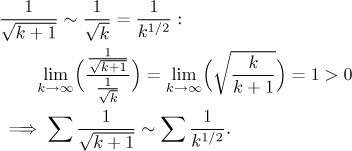Problem: Determine whether the following series converges absolutely.
![]()
Solution: To determine whether the given series converges absolutely we will test whether the following series converges:
![]()
This is a series with non-negative terms and we have all the nice tests
available. What tests will work? Since the series consists of powers (and
roots), the best test for it is some
comparison. We guess that for
k large the
![]()
The series on the right is divergent (by the
p-test,

Now the divergence of the test series can be used to conclude that our series is divergent.
Conclusion: The given series is not absolutely convergent.
Is there another way to prove this divergence? We know that the Root test and the Ratio test do not work for series with polynomials (and roots). Indeed, we get the indecisive case 1.

One last possibility: The terms of the series are given by the function

So the integral test confirms divergence of the series with absolute value.
Remark: The series itself is convergent. It is an alternating series
and the terms